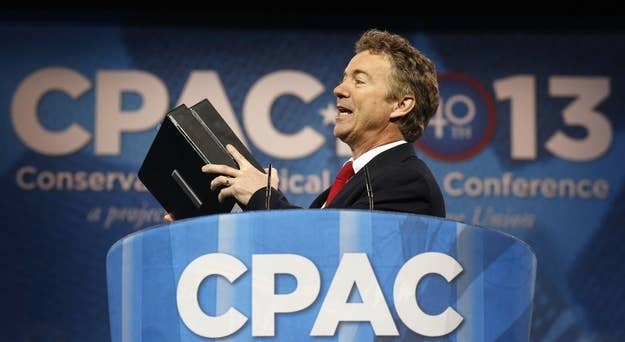
NATIONAL HARBOR, Md. — The irreconcilable tension between new and old schools of Republican foreign policy thought was on display merely in the selection of panels on the first day of the Conservative Political Action Conference on Thursday.
A panel about "Iran and the Islamist Threat" featuring Sen. Lindsey Graham came on the heels of one called "Too Many American Wars?" in which speakers argued that America had become overextended after nearly a century of nonstop warfare. A speech by Rand Paul, arguing against abuse of the drone program and in favor of cutting foreign aid to countries like Egypt, followed a panel about lingering questions over the Benghazi attack.
As clear as the differences between the two schools was the fact that the more libertarian-leaning vein is ascendant, at least among the conservatives gathered here. The Benghazi panel emptied the room and the Iran panel barely filled half of a smaller conference room, while Rand Paul's message brought a packed ballroom to its feet, many holding "Stand With Rand" signs.
The "Too Many American Wars?" panel included Reps. Steve King, Tom Cotton and Louie Gohmert, all staunch conservatives with varying degrees of hawkish views on national security. Gohmert argued that the U.S. should have gone to war with Iran in 1979 and that we only lost the Vietnam war because "people in Washington decided we would not win it," among other things. But the very existence of a panel with that name indicated the changing attitudes among conservatives towards what were once alternative views, and other speakers advocated libertarian foreign policy that, they argued, would result in less domestic spending as well. The argument was tailored to make a smaller defense budget seem more attractive to conservatives.
"Continuous warfare is what we've had since World War II," said Ivan Eland, a libertarian defense analyst. "That's an aberration in U.S. history. The government has ballooned both in security areas but also, domestic spending always increases during war."
"There is a connection between the warfare and the welfare state," Eland said. He argued that China and Brazil are "not policing the world, but they're competing with us economically."
Boston University professor Angelo Codevilla made the case against nation-building, saying "if you do engage in war you had better have an idea of how you are going to end it."
"In Afghanistan, we spoiled it all by occupying the country and trying to tell them how to live, and we made thousands and thousands of enemies," Codevilla said.
Later, after a speech by likely 2016 rival Marco Rubio, Rand Paul took the stage in jeans to a Metallica song. After an extended riff about drone strikes — the topic that filled his 13-hour filibuster of John Brennan's nomination as CIA chief last week — Paul criticized President Obama for finding "an extra $250 million to send to Egypt. You know, the country where mobs attacked our embassy, burned our flag, and chanted death to America."
"You know, the country whose President recently stood by his spiritual leader, who called for death to Israel and all who support her," Paul said. "I say, not a penny more to countries that burn our flag."
Paul stopped short of calling for cutting aid to Israel itself, something he's advocated in the past.
This new tone was missing in other foreign policy events during the day. The Benghazi panel repeated the same themes about the attack in Libya that have been circling in the conservative media since it happened. And panelists were clear: defense cuts can't be acceptable in a conservative foreign policy.
"We must not make defense the first victim of cuts," said Breitbart News editor Joel Pollak. "Our constitution calls for limited government, but it also calls for a government that can defend the nation. Benghazi reminds us we cannot defend liberty if we cannot take the fight to our enemies."
But Benghazi panel proved especially unpopular, with people trickling out of the large ballroom throughout.
The panel on Iran, hosted by hawkish Foundation for the Defense of Democracies president Cliff May and featuring Graham, hit familiar notes about getting tough on Iran's nuclear program and standing firm with Israel.
"Our friends in Israel wil never know a good night's sleep again" if Iran develops a nuclear weapon, Graham said.
The ayatollahs "are trying to spread the Shia religion and intimidate their neighbors," Graham said. "The amount of enriched uranium is going up, not down. We talk, they enrich."
"My goal is to pass a resolution sooner rather than later that defines what having Israel's back means," Graham said, saying that it would mean providing military support in the event that Israel takes action against Iran.
Other speakers also advocated against defense cuts and in favor of pre-emptively taking action against Iran.
"We're trying to get to fiscal responsibility and I'm afraid we're doing it on the backs of our military," said Rep. Buck McKeon, chairman of the House Armed Services Committee.
"All of our statements about being tough have to be matched with our actions," Graham said.
Most of the crowd nodded along and occasionally clapped. But the tough talk didn't rub everyone the right way. At the end of the panel, Adam Kahn, the president of the college Republicans and the University of Nevada-Reno, got up to ask a question.
"I am a Muslim-American, I am a Persian," Kahn said. "You can't say that 'Muslim' is synonymous with 'terrorist.'"
"We're not terrorists," Kahn said. "We're good people."
